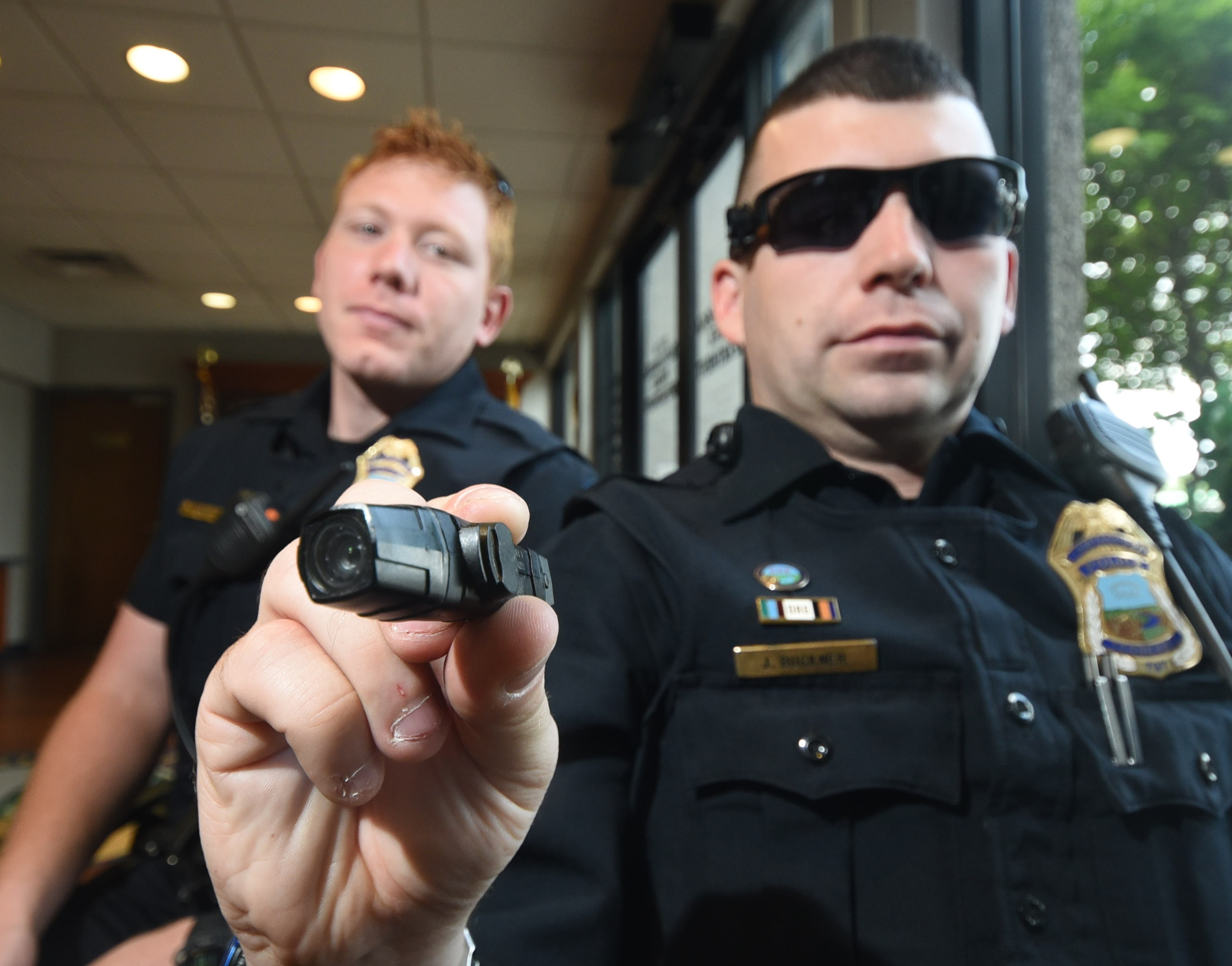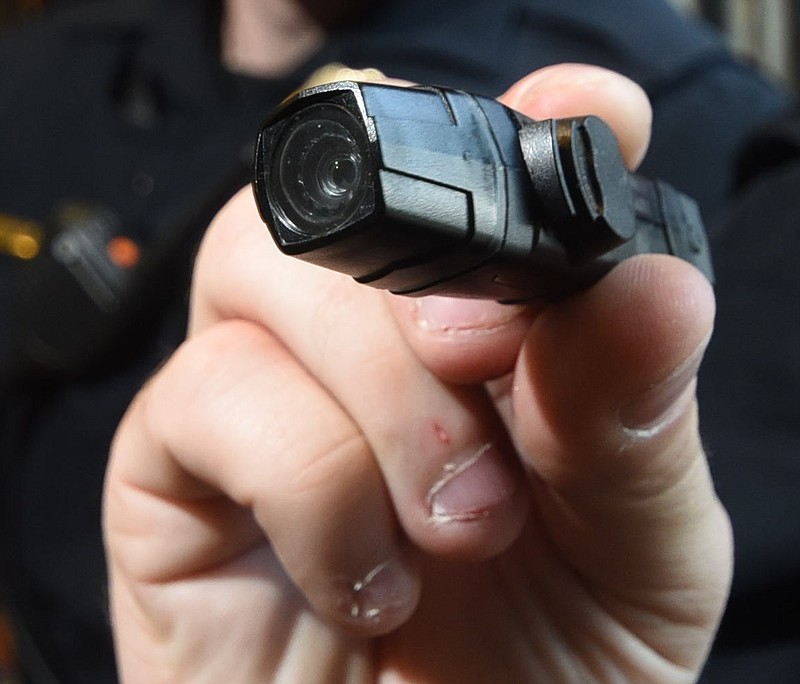 Chattanooga Police Officer Jeff Buckner holds is AXON FLEX personal body camera that he is testing for the department on Thursday in the lobby of the Police Service Center on Amnicola. Buckner's camera mounts to the pair of sunglasses he is wearing. Officer Hunter Morgan, left, is testing a chest mounted body cam.
Chattanooga Police Officer Jeff Buckner holds is AXON FLEX personal body camera that he is testing for the department on Thursday in the lobby of the Police Service Center on Amnicola. Buckner's camera mounts to the pair of sunglasses he is wearing. Officer Hunter Morgan, left, is testing a chest mounted body cam.By early next year, every Chattanooga police officer will be wearing a body camera, but in the meantime police officials must navigate complicated issues of privacy, transparency and public records as they craft policies to guide the use of the cameras.
Officials must decide when officers should turn cameras on and off, what types of incidents should be recorded, how long video should be kept on file, under what circumstances administrators review that footage, how videos should be released to the public and a slew of similar matters.
Should police record inside someone's home? Should officers capture video of interviews with victims? What about a conversation between officers over coffee? What happens to video of officer-involved shootings?
"If body cameras are going to be used, there has to be very clear policy that balances accountability versus privacy," said Hedy Weinberg, executive director of the American Civil Liberties Union of Tennessee. "And that's really the central question."
The police department's body camera policy is not yet written, but Chief Fred Fletcher said leaders are giving careful consideration to the policy's scope.
Fletcher expects officers will be required to turn on their cameras for any law enforcement encounter.
"And that is the devil in the details - clearly defining what a law enforcement encounter is," he said.
Officers likely will be required to start their cameras anytime they respond to a call for service, Fletcher said, as well as if they arrest or detain someone, attempt to make an arrest, or expect to make an arrest.
That's similar to many body camera policies across the nation, according to a 2014 study by the nonprofit Police Executive Research Forum.
The study found most departments order officers to film when responding to incidents, but also give them the discretion not to record if it would be "unsafe or impossible," and in certain sensitive situations, like an interview with a confidential informant.
Also Read
Cooper: Body cameras: Friend and foe?
Most departments also allow officers to film inside a private citizen's home if the officers have a right to be there, the study found.
All videos filmed by police body cameras are public record, just like videos from patrol car dashboard cameras, said Deborah Fisher, executive director of the Tennessee Coalition for Open Government.
That means footage of a private citizen's home potentially could be released to the public, which raises privacy concerns, Weinberg said. The ACLU suggests officers ask for permission before filming inside homes, unless the officers are responding to an emergency or critical incident.
Fletcher said officers will record inside homes, but the videos likely will be blurred to remove private information if a member of the public or media asks for copies of that footage.
"Say there is a family photo on the wall, you can blur that out and leave everything else," he said. "If there was an officer-involved shooting [inside a home], you could blur out everything to the right and the left and leave the pertinent stuff in the middle unredacted. Technology takes care of a lot of the privacy concerns that existed when these conversations started a couple of years ago."
The department will also need to decide how long to store body camera footage. The Chattanooga policy will likely set out ranges of retention for various incidents, Fletcher said. On one end of the spectrum, police will keep videos of critical incidents indefinitely. Other material, like routine conversations and day-to-day work, will be deleted more quickly.
Police now keep routine dashboard camera footage for 18 months, Fletcher said. He expects the body camera policy will be similar.
Fisher said it's important not to let concerns about privacy overshadow the intent of body cameras, which she said is to increase police accountability, especially in incidents where a police officer shoots or kills a civilian.
"Yes, there are situations where citizen privacy needs to be maintained," she said. "It's very complicated, but we have to look at it so we don't lose the purpose of the body camera, which is better accountability - which should mean better policing, right?"
In July, Fisher's organization polled more than 500 Tennesseans and asked for their opinions on how body camera footage should be used. Ninety-one percent of the people polled believed police should wear body cameras, and 92 percent said police should release footage of incidents in which a civilian was injured or killed by a police officer.
Current state law allows police to withhold documents and video that would typically be considered public record until the end of a criminal investigation, Fisher said. That means police aren't required to release body camera footage of officer-involved shootings for as long as the investigation is ongoing.
Both Weinberg and Fisher said police departments should voluntarily agree in their policies to release such videos shortly after an officer-involved shooting, rather than waiting weeks or months for the investigation to conclude.
"Footage of any incident where there is a use of force that results in a shooting or a death needs to be made available to the public," Weinberg said, "and needs to be made available before the investigation is closed."
Contact staff writer Shelly Bradbury at 423-757-6525 or sbradbury@timesfreepress.com with tips or story ideas. Follow @ShellyBradbury.
